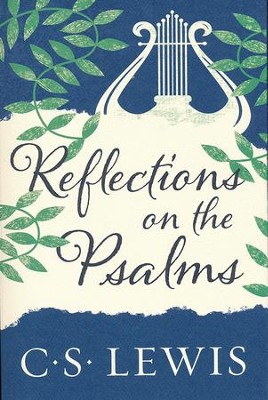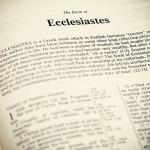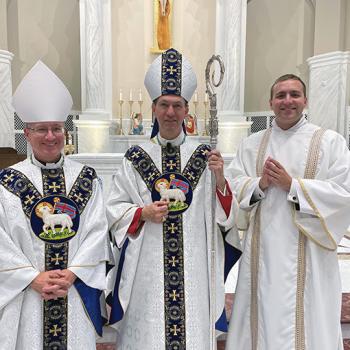C.S. Lewis is one of the most popular Christian writers of the twentieth century. He is the author of such works as Mere Christianity, Screwtape Letters, and the Narnia series. In Reflections on the Psalms Lewis takes a look at this great book of scripture, and strives to help the unlearned discover the meaning of the book.

Background of C.S. Lewis
This can be seen in the opening paragraph of the introduction. In it Lewis writes, “This is not a work of scholarship. I am no Hebraist, no higher critic, no ancient historian, no archaeologist. I write for the unlearned about things in which I am unlearned myself (Introductory, page 1).” Lewis was not only known as one of the brightest minds of the twentieth century, but he was also known as a lay theologian and apologist. These opening sentences display a great amount of humility.
He continues his introduction by giving examples of how the unlearned can learn from each other. He gives an example that most of us can relate to. He described two children who are trying to solve a problem. When one goes to the expert one becomes confused, but when he goes to another student they work through it together. He takes this example from his time as a teacher, but is quick to point out that he is writing from one amateur to another (page 2). This is on display throughout the work as Lewis discusses his view on every topic brought about in the Psalms. He does so in a relatable manner that is easily understood. One more thing to consider while reading the work is that Lewis was a high church Anglican. Thus, there is some language that may not familiar to mainline Protestants, but are familiar to Roman Catholics and Greek Orthodox. Those are very rare, and Lewis does a masterful job of explaining what is meant. He accomplished what he set out to do with this excellent work.
Psalms And Judgment
The first aspect of the Psalms that Lewis discussed is Judgment. In the second paragraph of the chapter Lewis describes a great surprise. In regards to this surprise Lewis writes, “It is therefore with great surprise that I first noticed how the Psalmists talk about the judgment of God (page 9).” He sees the parallel in the Jewish and Christian view of judgment. That being that both see it as a court on Earth. Lewis describes the Christian view of judgment and does an excellent job of defending his position.

Lewis follows the chapter on judgment with a chapter about the cursings. The cursings in the Psalms are interspersed with forgiveness, mercy, and pleas for help. They are uncomfortable to read, and to those who do not understand it as poetry, can be very troubling. Lewis describes those who are troubled as “Almost comic in its naivety (page, 20). In the cursings he finds man at fault for misinterpreting the text. Lewis writes at length about the necessity of understanding allegory. The Psalms were written as songs, should be seen as poetry, and thus allegory is vital in determining the meaning of the cursings.
C.S. Lewis On Death
In Chapter four Lewis moves on to death in the Psalms. He describes the Jewish idea of sheol and the thought of the afterlife in the Old Testament. In describing sheol Lewis is not sure how an ancient Jew thought about it. He concludes that the idea is not pleasant and can be compared to Hades in Greek literature. It is a place that is neither Heaven or Hell. In regards to the Old Testament Lewis writes, “It seems clear that in most parts of the Old Testament there is little or no belief in the future life (page 36).” He then describes the change that came about in the New Testament.
Chapter five discussed the Beauty of the Lord, and one can almost see how much more relaxed Lewis is now that he is on a pleasant topic. Lewis states that the Psalms describe the Beauty of the Lord better than any other book in existence. He goes into detail about how the Psalms describe this. Perhaps what is most fascinating is how he describes someone who is truly worshipping God, or someone who is going through the motions.
C.S. Lewis And The Law
Chapter Seven has the interesting title of “Sweeter than Honey.” This describes the Law that is present throughout the Psalms. This concept is hard for our modern ears to fathom. Describing this C.S. Lewis writes, “One can well understand this being said of God’s mercies, God’s visitations, His attributes. But what the poet is actually talking about is God’s law (page 54).” God’s law is sweeter than honey because it leads us on the path of a moral and just life. However, it is an area that all too often taken for granted.
In Chapter seven C.S. Lewis takes on the topic of Connivance. Connivance is the act of being involved secretly in wrongdoing. He discusses the dishonesty that was occurring in his day. How people were leading double lives to cheat and steal. He does discuss politics and public life briefly, but points out that the Psalms are concerned with our private lives. Lewis concludes the chapter by discussing sins of the tongue. Lewis writes about the war and strife that plagued the period in which the Psalms were written. He admits that he thought that violent crimes would be written about more in the Psalms, but to his surprise this is not the case. The crime to which the Psalms speak of most are sins of the tongue. That is something that still plagues mankind today.
Poetry Of The Psalms
Lewis then turns to the concept of nature in Chapter seven. This goes beyond the aspect of the trees, animals, and other things we things of when discussing nature. Here the Psalms, and Lewis, are concerned with the nature of being and nature itself. It is emblematic of the poetry with which the Psalms were written. The ancient Israelites were more agricultural than we think. At the times the Psalms were written there a piece of land could be called a country, or a country was allegorically known as the world. To Lewis these are important considerations when reading the Psalms.

The Importance Of Praise
Lewis moves on to the topic of praising in chapter eight. The opening line of the chapter states, “It is possible (and it is hoped) that this chapter will be unnecessary for most people (page 90).” He goes into detail about the importance of praising God, and why it is necessary to do so. He closes the chapter by saying that it will only be helpful to handful of readers. He lets his sense of humor shine though by saying that everyone else will get a good laugh from it.
C.S. Lewis And Scripture
The following three chapters conclude the work and are involved with second meanings, scripture, and second meaning in the Psalms. These three chapters are where the intellect of Lewis is on full display. He discussed how these topics relate to modern Christianity. He describes how he had been treating the Psalms in a manner in which the original poets intended, but this is not the method used by Christians today. Lewis describes the second meaning, one that lies beyond face value, and what we call the allegorical meaning. According to Lewis allegorical meaning can be seen throughout the Old Testament. Lewis writes, The full significance of what the writers are saying is, on this view, apparent only in the light of events which happened after they were dead (page 99).” This is not a new concept in Biblical exegesis, and has been used by many church fathers. The well-known church fathers Origen and Augustine have been quoted extensively regarding this method. Augustine writes in his Anti-pelagian writings, “This grace hid itself under a veil in the Old Testament, but it has been revealed in the New Testament according to the most perfectly ordered dispensation of the ages, forasmuch as God knew how to dispose all things .” Augustine repeats this concept repeatedly in his commentary on the Psalms.
Highly Recommended
Reflections on the Psalms has many strengths. Lewis’s writing style is accessible, and not intimidating. In other words, it is written in an everyday style that everyone can understand. Another strength is the pure mastery in which Lewis gets his point across. He uses everyday circumstances, mixed with historical examples, to teach what he believes the Psalms portray. Weaknesses in the work are hard to come by, but as stated in the introduction, some terms are not known by Christians that do not have a liturgical background.
In Reflections on the Psalms Lewis accomplishes what he set out to do. He writes a summary of the Psalms that is not scholastic or academic, but meant for the everyday person sitting in the pew. The work is recommended for Christians of all stripes, from minsters to layman. Everyone will benefit from Lewis’s mastery to define terms, and ability to paint vivid descriptions to the Psalms.
BIBLIOGRAPHY
“Npnf1-05. St. Augustine: Anti-pelagian Writings,” Christian Classics Ethereal Library, http://www.ccel.org/ccel/schaff/npnf105.xi.xxx.html.
Lewis, C.S. Reflections on the Psalms. New York: Harvest Books, 1986.













